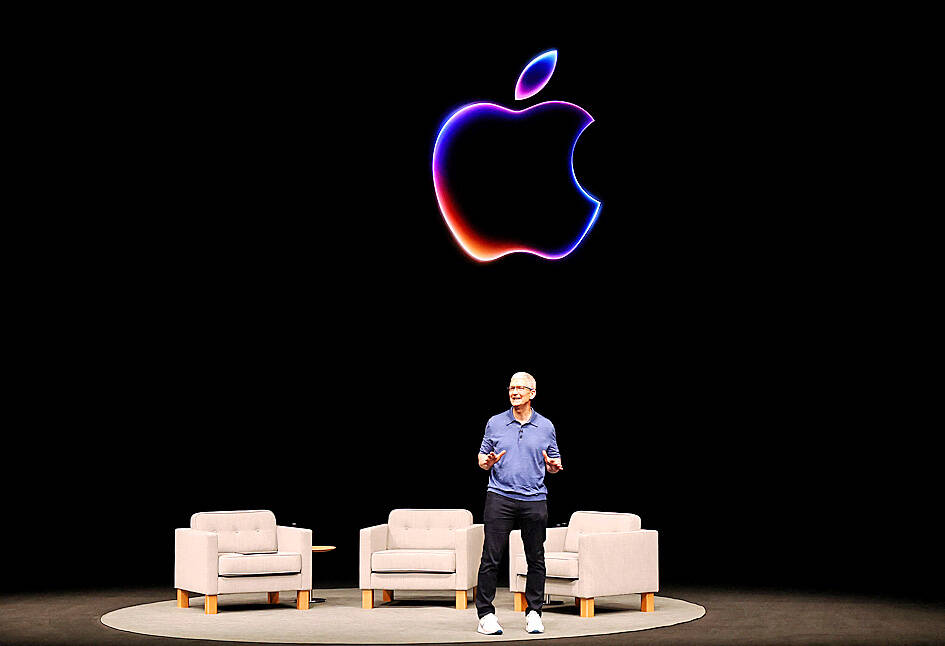Apple Inc on Monday unveiled “Apple Intelligence,” its suite of new artificial intelligence (AI) features for its devices — and a partnership with OpenAI — as it seeks to catch up to rivals racing ahead on adopting the white-hot technology.
For months, pressure has been on Apple to persuade doubters of its AI strategy, after Microsoft Corp and Google rolled out products in quick succession.
However, this latest move would take the experience of Apple products “to new heights,” Apple CEO Tim Cook said as he opened the annual Apple Worldwide Developers Conference at the tech giant’s headquarters in the Silicon Valley city of Cupertino, California.

Photo: AFP
To help toward that end, Apple has partnered with OpenAI, which ushered in a new era for generative AI in 2022 with the arrival of ChatGPT.
OpenAI was “very happy to be partnering with Apple to integrate ChatGPT into their devices later this year! Think you will really like it,” OpenAI CEO Sam Altman wrote on social media.
Apple Intelligence is also to be added to a new version of the iOS 18 operating system, similarly unveiled on Monday at the week-long conference.
Privacy safeguards have been built into Apple Intelligence to make its Siri digital assistant and other products smarter, without pilfering user data, Apple executives said.
The big challenge for Apple has been how to infuse ChatGPT-style AI — which voraciously feeds off data — into its products without weakening its heavily promoted user privacy and security, analysts said.
The system “puts powerful generative models right at the core of your iPhone, iPad and Mac,” Apple senior vice president of software engineering Craig Federighi said. “It draws on your personal context to give you intelligence that’s most helpful and relevant for you, and it protects your privacy at every step.”
However, tech tycoon Elon Musk lashed out at the partnership, saying the threat to data security would make him ban iPhones at his companies.
“Apple has no clue what’s actually going on once they hand your data over to OpenAI. They’re selling you down the river,” Musk wrote on social media.
Musk is building his own rival to OpenAI, xAI, and is suing the company, which he helped found in 2015.
Apple Intelligence, which runs only on the company’s in-house technology, would enable users to create their own emojis based on a description, or to generate brief summaries of e-mails in the mailbox.
Apple said Siri, its voice assistant, would also get an AI-infused upgrade and would appear as a pulsating light on the edge of the home screen.
In its deal with OpenAI, users can choose to enhance Siri on certain requests with ChatGPT, Federighi said.
“It sounds like it’s Apple — then if it needs ChatGPT, it offers it to you,” Techsponential analyst Avi Greengart said. “The implementation is what is special here.”
The partnership with OpenAI was not exclusive.

When an apartment comes up for rent in Germany’s big cities, hundreds of prospective tenants often queue down the street to view it, but the acute shortage of affordable housing is getting scant attention ahead of today’s snap general election. “Housing is one of the main problems for people, but nobody talks about it, nobody takes it seriously,” said Andreas Ibel, president of Build Europe, an association representing housing developers. Migration and the sluggish economy top the list of voters’ concerns, but analysts say housing policy fails to break through as returns on investment take time to register, making the

EARLY TALKS: Measures under consideration include convincing allies to match US curbs, further restricting exports of AI chips or GPUs, and blocking Chinese investments US President Donald Trump’s administration is sketching out tougher versions of US semiconductor curbs and pressuring key allies to escalate their restrictions on China’s chip industry, an early indication the new US president plans to expand efforts that began under former US president Joe Biden to limit Beijing’s technological prowess. Trump officials recently met with their Japanese and Dutch counterparts about restricting Tokyo Electron Ltd and ASML Holding NV engineers from maintaining semiconductor gear in China, people familiar with the matter said. The aim, which was also a priority for Biden, is to see key allies match China curbs the US

NOT TO WORRY: Some people are concerned funds might continue moving out of the country, but the central bank said financial account outflows are not unusual in Taiwan Taiwan’s outbound investments hit a new high last year due to investments made by contract chipmaker Taiwan Semiconductor Manufacturing Co (TSMC, 台積電) and other major manufacturers to boost global expansion, the central bank said on Thursday. The net increase in outbound investments last year reached a record US$21.05 billion, while the net increase in outbound investments by Taiwanese residents reached a record US$31.98 billion, central bank data showed. Chen Fei-wen (陳斐紋), deputy director of the central bank’s Department of Economic Research, said the increase was largely due to TSMC’s efforts to expand production in the US and Japan. Investments by Vanguard International

‘SACRED MOUNTAIN’: The chipmaker can form joint ventures abroad, except in China, but like other firms, it needs government approval for large investments Taiwan Semiconductor Manufacturing Co (TSMC, 台積電) needs government permission for any overseas joint ventures (JVs), but there are no restrictions on making the most advanced chips overseas other than for China, Minister of Economic Affairs J.W. Kuo (郭智輝) said yesterday. US media have said that TSMC, the world’s largest contract chipmaker and a major supplier to companies such as Apple Inc and Nvidia Corp, has been in talks for a stake in Intel Corp. Neither company has confirmed the talks, but US President Donald Trump has accused Taiwan of taking away the US’ semiconductor business and said he wants the industry back